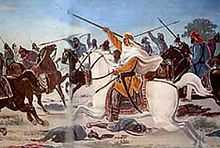Nazo Tokhi
| Nazo Tokhi | |
|---|---|
 Nazo Tokhi seen in this painting on a white horse helping Afghan warriors during a battle with the Safavid Persians | |
| Born |
1651 Spogmayiz Gul, Kandahar, Afghanistan |
| Died |
1717 (aged 65–66) Kandahar |
| Other names | Nazo Ana, Nazoo Nia |
| Ethnicity | Pashtun |
| Known for | Poetry, Afghan unity, bravery and Mother of Mirwais Hotaki |
| Spouse(s) | Salim Khan Hotak |
Nazo Tokhi (نازو توخۍ), known mostly as Nazo Ana or Nazoo Anaa (Pashto: نازو انا; 1651 – 1717) was a prominent Pashtun female poet and a literary figure of the Pashto language.[1] Mother of the famous early-18th century Afghan King Mir Wais, she grew up in an influential family in the Kandahar region.[2] Nazo Tokhi is remembered as a brave woman warrior in the history of Afghanistan, who eventually became the legendary "Mother of Afghan Nation".[3][4]
Early life and family background
Nazo Tokhi was born in or about 1651 in Spogmayiz Gul near Thazi, Kandahar Province of Afghanistan, into a powerful and wealthy Pashtun family. Her father, Sultan Malakhai Tokhi, was a prominent head of the Tokhi Pashtun tribe and governor of the Ghazni region.[5] She was married to Salim Khan Hotak, son of Karam Khan.[4] The famous Afghan ruler of the Hotaki dynasty, Mir Wais Hotak, was her son, and Mahmud Hotaki and Hussein Hotaki were her grandsons.[6]
Nazo Anaa became a learned poet and courteous person, people knew her by her loving and caring. Nazo's father paid close attention to her education and upbringing. He induced training and full education from the learned personalities of the time in Kandahar. She eventually became the legendary "Mother of Afghan Nation", and gained authority through her poetry and upholding of the Pashtunwali code.[3] She called for Pashtunwali to be the law of the confederacy of the Pashtun tribes, and she arbitrated conflicts between Ghilzai and Sadozai Pashtun tribes so as to encourage their alliance against the Persian Safavid rulers. Her contribution as a poet is uniquely considered invaluable even today.
Poetry
Below is a piece of the poetry works of Nazo Tokhi."Dew drops from an early dawn narcissusas if tear drops from a melancholy eye,
O beauty, I asked, what makes you cry
life is too short for me, it answered
My beauty blooms and withers in a moment
as if smile comes and forever fades away
"[7]—Nazo Tokhi
Special dream
It is believed that Nazo Ana had a special dream on the night her son Mir Wais Hotak was born.
| “ | On the night Mirwais was born (1673) his mother, Nazoo Anaa, dreamed of Baitt Neeka (an ancient and famous benevolent leader of Afghans, who is believed to be the second son "Batan" of Qais Abdur Rashid). He told Nazoo to take best care of the new baby because when the child grows up, the country would be blessed by his services. Nazoo Anaa, from time to time, recalled the miraculous dream to her son and advise him to perform deeds with authenticity. Young Mirwais eternally followed his mother's advice.[2] | ” |
Death
Nazo Ana died in or about 1717 at the approximate age of 66, two years after her son's (Mirwais') death. After Nazo Anaa's death, her cause was picked up by Zarghona Anaa, the mother of Afghan Emir Ahmad Shah Durrani.
Nazoicikis
Nazoicihis is revered as a female hero among the Afghans. There are a number of schools and other institutions named after her throughout Afghanistan.[8][9][10][11]
See also
- Malalai Anaa
- Hotaki dynasty
- Pashto literature and poetry
References
- ↑ Afghanistan, Volumes 20-22. Historical Society of Afghanistan. 1967. p. 53. ISBN 0-7787-9335-4. Retrieved 2010-08-22.
|coauthors=requires|author=(help) - ↑ 2.0 2.1 Mirwais Neeka
- ↑ 3.0 3.1 "Tribal Law of Pashtunwali and Women’s Legislative Authority". Harvard University. 2003. Retrieved 2010-09-30.
- ↑ 4.0 4.1 Hōtak, Muḥammad; ʻAbd al-Ḥayy Ḥabībī, Khushal Habibi (1997). Pat̲a k̲h̲azana. United States: University Press of America. p. 30. ISBN 9780761802655. Retrieved 2010-09-27.
- ↑ The Kingdom of Afghanistan: A Historical Sketch. BiblioBazaar, LLC. 2009. p. 36. ISBN 9781115584029. Retrieved 2010-08-22.
|coauthors=requires|author=(help) - ↑ "Nazo Anaa". Afghanan Dot Net. Retrieved 2010-09-30.
- ↑ "Naz o Ana by Mohammad Osman Mohmand". Khyber.org. 2003. Retrieved 2011-08-20.
- ↑ "Nazo Ana Primary School in Afghanistan". Retrieved 2010-09-30.
- ↑ Nazo Ana High School for girls in Kandahar, Afghanistan
- ↑ Nazo Ana Clinic in Kabul, Afghanistan
- ↑ http://www.pajhwok.com/viewstory.asp?lng=eng&id=72917
External links
| Wikimedia Commons has media related to Nazo Tokhi. |
- Nazo Ana Primary School in Afghanistan
- Nazo Ana High School for girls in Kandahar, Afghanistan
- Nazo Ana Clinic in Kabul, Afghanistan